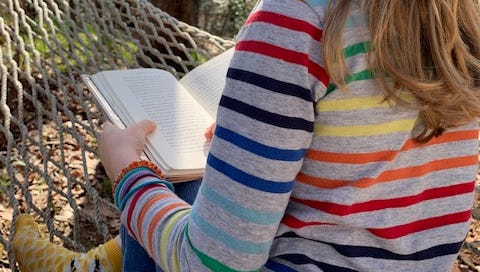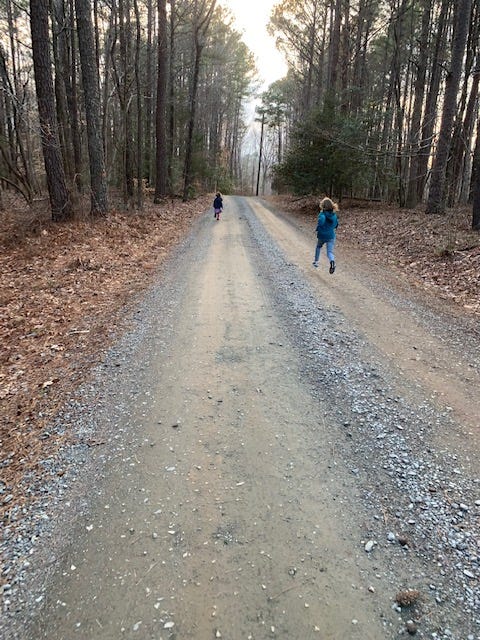Hi there, Frog Troublers! As you may know from earlier posts, I’m a proud member of Writers for Democratic Action, a national group formerly known as Writers Against Trump. Our mission is “bringing together the literary community to demand racial and economic justice, champion suffrage for all people, oppose impediments to democratic government, and resist white supremacist, nationalist, and fascist movements.” And if you’re reading this here newsletter, you’re part of that community, so go ahead and sign up already!
In North Carolina, our chapter is led by the wonderful Jill McCorkle, and she suggested that we pair up with the Texas chapter, led by the equally wonderful Robin Davidson, to say something about how writers can encourage voting in our states. Because here’s the thing about red, purple, and even we-thought-they-were-blue states like Virginia: we are either terribly voter suppressed or about to be voter suppressed.
So we penned this short open letter and published it yesterday on LitHub. The title is a little misleading—we’re not asking Southern writers to do this alone, but all writers engaging with audiences in our states.
Here’s some detail about how hard it is to vote in just Texas and North Carolina:
Our states are under attack. You’ve likely read, with outrage, about Texas Governor Greg Abbott’s assault on the rights of students, teachers, and especially on trans kids and their families. We imagine you know that almost all abortions are illegal in Texas, yet that most Texans can now carry handguns in public without a permit or training. We appreciate and share your outrage but we also need you to know: it’s hard for us to make changes here, because it’s hard to vote.
Texas is the most difficult state in the nation to cast a ballot in, and one of the places hardest for people of color to make their votes count. Our increasingly diverse state should be one of the most dynamic and electorally competitive in the nation, but a 2021 Republican gerrymander created, instead, one of the most politically and racially skewed maps in the country.
Mail-in ballots were rejected at absurdly high rates in Texas’s recent primary—in some urban and suburban districts, by as much as 22 percent (compared to rates around 3 percent in 2018)—as a result of SB1, a restrictive new voting law that especially targets Black and Latinx voters, as well as the poor. The new voting law disenfranchises voters by ending drive-thru voting, making it much harder to cast mail-in ballots, and limiting early voting.
In North Carolina, things are better—but not by much. As in Texas, our growth has been driven by communities of color, but current legislative districting has meant that the will of the people is not represented by our elected officials. In 2020, Democrats in North Carolina statewide received 49 percent of the vote, but won only 43 percent of the seats in our state legislature. Recent redistricting, led by our Republican-majority legislature, was just declared unconstitutional by the state’s supreme court.
We know that anti-democratic forces will find other ways to suppress the vote in North Carolina. North Carolina’s Republican-led legislature has been closing down polling places for years, with a particular focus on universities and HBCUs. They ended the Souls to the Polls tradition of early voting the Sunday before election day. They have tried again and again to force through voter ID laws, and in preparation have closed down DMVs across the state, making it harder for people to get official IDs.
In 2020, voters faced long lines, especially in urban areas, as well as disproportionate disqualification of mail-in ballots by Black and Latinx voters. In the small town of Graham, North Carolina, 200 people, including children and elderly people, were pepper-fogged at a Black Lives Matter march to the polls on the last day of early voting.
It shouldn’t be hard to vote! Election Day should be a national holiday, and we should have plenty of chances to vote early or by mail. But it’s not, and they’re slowly eroding our hard-won early-voting and vote-by-mail rights. In response, we feel that it’s our responsibility to help and encourage other people to exercise their sacred right. And that starts with talking about voting. Especially for writers who tour the country, heading to bookstores, festivals, and colleges and universities—we have a terrific platform for talking about this sacred right, and Jill and Robin and I feel we should use it. Here is what we propose:
[W] hen you read in Texas and North Carolina, whether on Zoom or in person, this is our request: talk about voting. Ask your hosts to provide voter registration cards and information, either through Book the Vote or the local board of elections. Tell your readers that voting is essential, that you plan to vote on the next election day (or early, or by mail), and that you want to help others get registered too.
It’s simple, nonpartisan, and especially important at universities, colleges, and community colleges, which have been hard-hit by voter suppression. Luckily, it’s often easiest to request voter education help in those spaces. Many schools have nonpartisan voter registration groups that will set up a table with information and voter registration cards.
I’ve done this for years at NC State, and I can’t wait for in-person events this fall… which happens to be a crucial election season. I’ve also started reaching out to other university reading series coordinators around the state, asking if they can join us. Our feeling is that no opportunity to mention voting or offer voter education should be missed.
And, since YA, middle grade, and children’s lit authors often have future voters (as well as their parents) in their audiences, we think they should get on board too. I asked Bea about her dream readers she’d like to see in NC, and she said Rick Riordan and Meg Medina. Mine are Miriam Toews and Louise Erdrich. (Oh! Bea said. Louise is one for me too.)
I also asked Bea last night for some book recommendations, because she has been reading up a storm. Here are some recent favorites from her, including one we’re still reading together:
Aru Shah and the End of Time by Roshani Chokshi: This is book one in a fantasy series from Rick Riordan Presents, so you know it’ll be good. Aru Shah tends to stretch the truth in order to fit in at her private middle school. While the other kids are going on exotic vacations, she spends her time in the Museum of Ancient Indian Art and Culture that her mom curates. It’s no wonder she makes up stories about being royalty and going to Paris. But one day three classmates show up and try to catch her in a lie. They dare her to light the Lamp of Bharata. But it awakens The Sleeper, an ancient demon! Her classmates and mom are frozen in time and Aru has to save them. I recommend this book because it’s very funny, a good retelling of Hindu myths, and extremely exciting.
The Girl Who Drank the Moon by Kelly Barnhill. This is a book told in many points of view, like my book, and in both third person and first person. Every year on the Day of Sacrifice, they leave a baby in the woods for a witch to supposedly “get.” But the witch actually takes the babies, feeds them starlight, and sends them to a new and better home. Until one day she accidentally feeds a baby moonlight. Starlight has magic in it, but moonlight is pure magic. She decides she has to raise this baby herself. I love this book because it has so much imagination and thought on every page—it’s one of the greatest books I’ve ever read.
El Deafo by Cece Bell. This is a graphic memoir about Cece Bell’s life and childhood growing up deaf with hearing parents. Starting at a new school is terrifying, especially if you have a giant hearing aid in your ear and a microphone that allows you to hear everything—even when the teacher is peeing! She doesn’t learn to sign because her school doesn’t have special classes for the deaf. Cece shows courage and bravery in the face of bullying, and finally makes real friends. I liked the drawings, so you can see what the narrator is thinking.
Kira-Kira by Cynthia Kadohata. My mom and I are reading this book together and it is hard to put down! It’s about two Japanese-American sisters, Katie and Lynn, growing up in Georgia in the 1950s. What we love about this book so far is the depiction of the closeness of the sisters, and the realistic way Cynthia Kadohata shows the difficulties Katie and Lynne face as one of just a few Japanese-American families in their small town.
Finally, here are a couple of cool news stories we liked:
Abbott Elementary has joined up with Scholastic Books to host free book fairs this month at Title 1 schools across the country. They’ll be giving two free books to every kid, and ten to every teacher. (And the show is finally back on tonight!)
We loved this New Yorker article about the idea to pay the endangered leopards for prints and designs featuring their iconic spots.
What have you been reading and enjoying lately, Frog Troublers?






Oh, I forgot to say we'll have more wild cat content on Friday--see you then!
⭐️⭐️⭐️⭐️⭐️most important FTT ever! also Bea! you make me want to read every book you’ve ever reviewed!